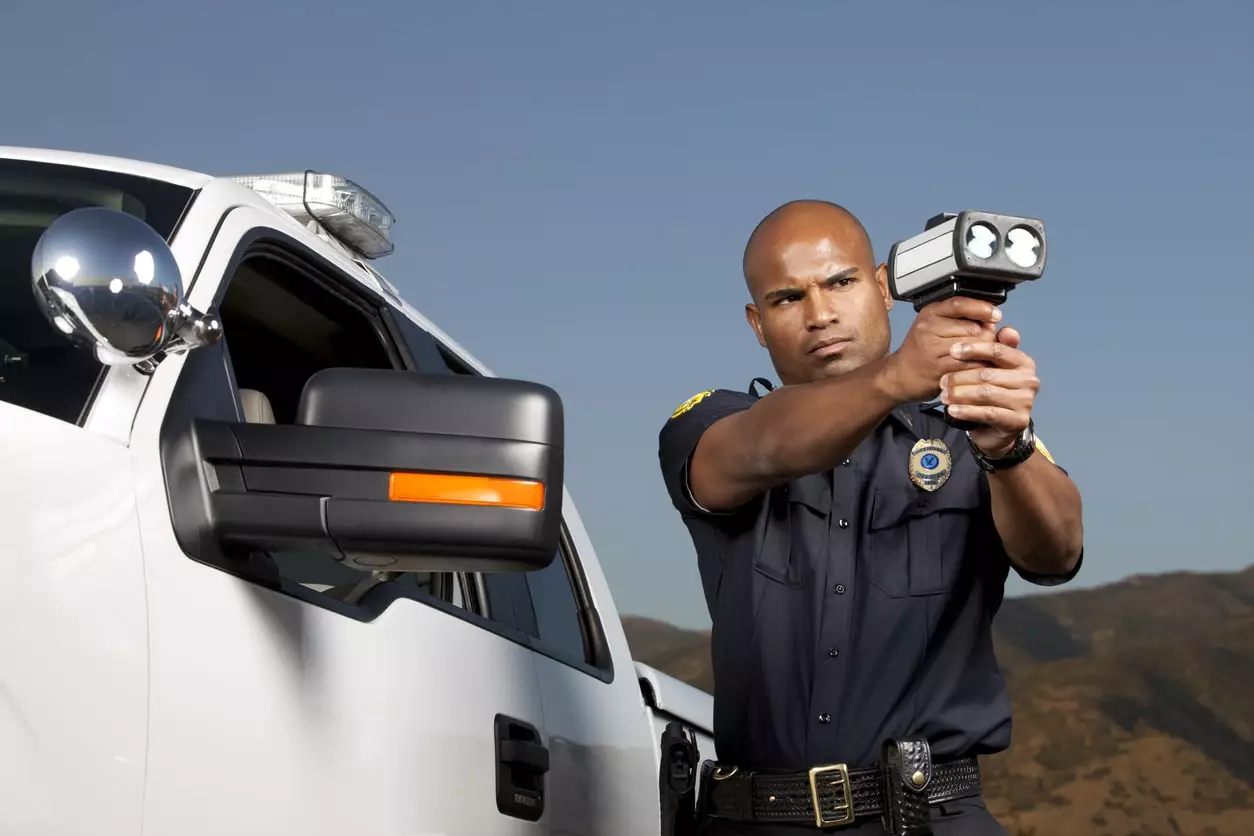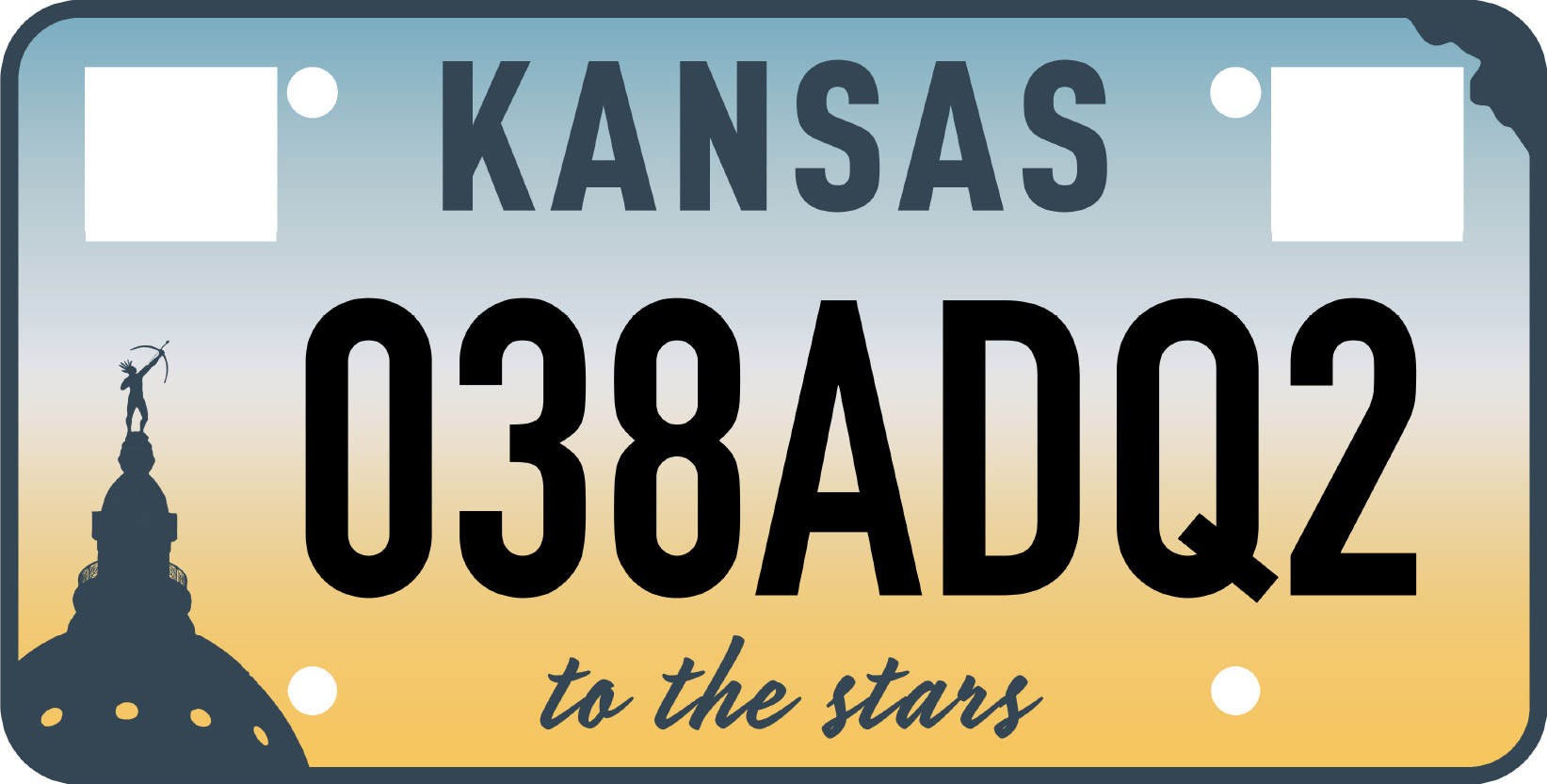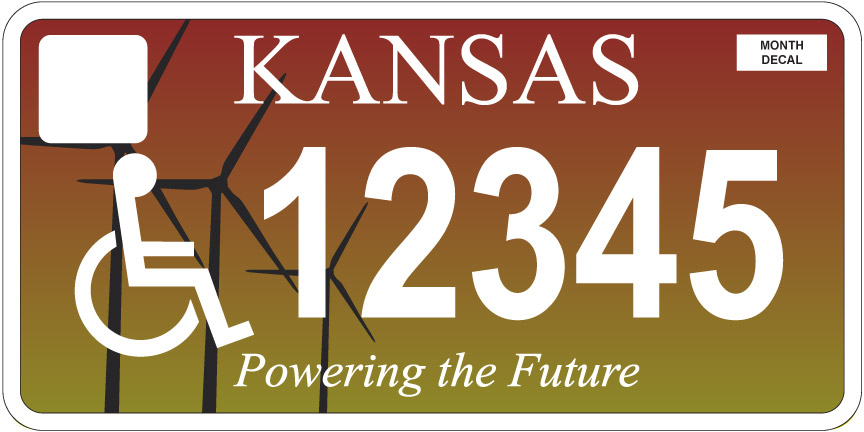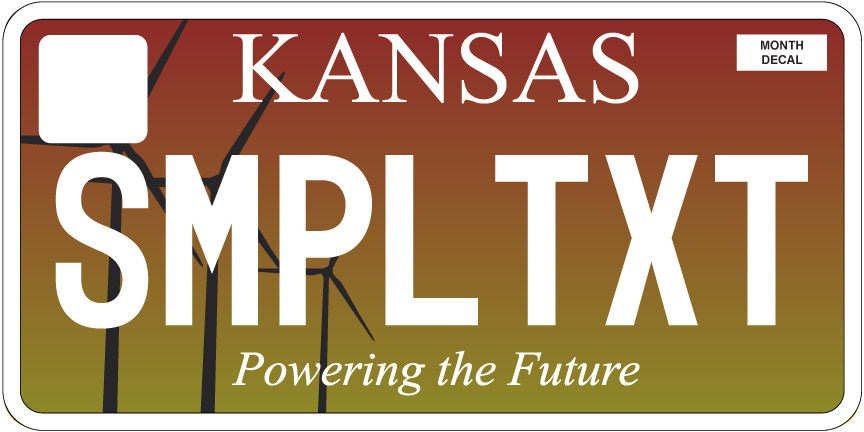 What Is a License Plate Reader and Can Police Track You Using It?
What Is a License Plate Reader and Can Police Track You Using It?
Table of Contents
- Kansas License Plates
- Kansas License Plate Design and Formats
- Kansas Vanity License Plate
- Most Popular Kansas Special Plate Numbers
- Kansas License Plate Lookup
- What Do I Need to Get a License Plate in Kansas?
- Differences Between a Passenger License Plate and a Commercial License Plate in Kansas
- How to Renew License Plate in Kansas
- How to Transfer a License Plate in Kansas
- Kansas License Plate Lookup Frequently Asked Questions (FAQ)
 Kansas License Plates
Kansas License Plates
Per Chapter 8-126a of the Kansas Statutes, a license plate, also called a number plate or tag, refers to any plate, tag, token, marker, or sign issued under the Automobiles and Other Vehicles Act for the purpose of identifying vehicles registered under the provisions of the Kansas motor-vehicle registration laws or otherwise carrying out the provisions of such laws.
In accordance with Chapter 8-127 of the Kansas Statutes, every owner of a motor vehicle, motorized bicycle, trailer, or semi-trailer intended to be operated on any highway must be registered with the Division of Vehicles of the Kansas Department of Revenue. In completing the registration process, the Kansas Division of Vehicles issues license plates to registered vehicles.
The Kansas Division of Vehicles typically issues the following types of license plates:
- Standard Plates: Standard plates are issued to cards, trailers, trucks, motorbikes, and motorcycles
- Personalized Plates: Personalized plates allow individuals to personalize their vehicle's registration with a unique message, slogan, or combination that holds personal significance. Note that the message on a personalized plate cannot be vulgar or appear to have an indecent meaning. The acceptability of the slogan, message, or combination selected by a vehicle owner will be decided by the State of Kansas DMV
- Specialty Plates: Specialty or specialized plates are number plates issued for specific purposes beyond standard vehicle identification. These plates are typically designed to raise awareness, support charitable causes, or signify membership in certain groups or organizations
- Education Plates: An education plate is a type of license plate issued to support educational institutions or related causes. The state issues education plates in support of institutions such as Benedictine College, Emporia State University, Fort Hays State University, Friends University, Kansas State University, Kansas University, Pittsburg State University, Washburn University, and Wichita State University
- Disability Plates: A disability license plate is a special license plate issued to individuals with disabilities. Typically, an individual can only receive one disability license plate in Kansas
- Military Plate: Military license plates are special license plates issued to current or former members of the U.S. Armed Forces, Marine Corps, Navy, Coast Guard, Air Force, Space Force, or Coast Guards or to vehicles registered in the name of a veteran or active-duty service member
Per Chapter 8-133 of Kansas Statutes, a Kansas-registered vehicle must not have a license plate attached to the front of the vehicle. Number plates must be attached to the rear of the vehicle and displayed during the current registration year or years. However:
- The license plate issued for a motor vehicle used as a dump truck with a gross weight of 26,000 pounds or more must be attached to the front of the vehicle except if such vehicle is registered as a farm truck
- The license plate issued for a motor vehicle used as a concrete mixer truck may be attached to either the front or rear of the vehicle
- A personalized license plate issued to a passenger vehicle or truck may be attached to the front of the passenger vehicle or truck
- The license plate issued for a truck tractor must be attached to the front of the truck tractor
- A model year license plate issued for an antique vehicle may be attached to the front of the antique vehicle
 Kansas License Plate Design and Formats
Kansas License Plate Design and Formats
Governor Laura Kelly announced a new Kansas standard-issue license plate design in December 2023. The new design was chosen by a majority of the public in a voting process involving more than 250,000 residents in 105 Kansas counties. Standard Kansas license plates are rectangular-shaped with a 7-character alphanumeric combination embossed on them.
The new design features the Kansas Statehouse dome in a cutout of the state and a white, yellow, and blue gradient background. Paying tribute to the Kansas State motto, "Ad Astra per Aspera", the phrase "To the Stars" is inscribed across the bottom of the new plate design. The new license plate will be issued starting from March 1, 2024.
Kansas license plates issued between August 15, 2018, and September 7, 2023, contained a screened black alphanumeric serial and pre-printed county code on a light blue plate. The top half of the Kansas State seal is screened in white color at the bottom right, and "KANSAS" is screened in dark blue at the top of the plate. From September 8, 2023, to February 29, 2024, license plates issued in Kansas contained a 7-character serial format instead of a 6-character code.
A Kansas personalized plate allows for a total of 7 letters, numbers, and spaces for automobiles or trucks and up to 5 letters, numbers, and spaces for motorcycles. The state does not permit the use of any symbol. Personalized plates are issued for 5-year cycles. All disabled personalized plates, whether for automobiles, trucks, or motorcycles, are allowed a total of 5 letters, numbers, and spaces.
Standard license plates for automobiles, commercial vehicles, and motorcycles:




* Source: Kansas Department of Revenue
 Kansas Vanity License Plate
Kansas Vanity License Plate
Kansas vanity license plates offer vehicle owners a personalized means of expressing themselves or showcasing their interests through unique combinations of letters, numbers, or characters. These plates, also known as personalized plates, allow individuals to create a custom message or slogan that holds personal significance to them. Vanity plates may also be issued to disabled persons, military veterans, or military officials and may be issued to automobiles, motorcycles, and trucks registered for 20,000 pounds or less
To qualify for a vanity or personalized license plate in Kansas, you must:
- Be a Kansas resident or member of the military who is not a resident of the state but is stationed at a military base or office in Kansas
- Have a Kansas vehicle title in your name or the leasing company's name for the vehicle to which the vanity plate is to be issued. If an antique vanity plate is required, the vehicle must be titled as an antique
- Have proof of valid insurance at the time of application
To obtain a vanity plate, follow these steps:
- Order the plate at a Kansas county treasurer's motor vehicle office. You may complete Form TR-715 and take it with you to the motor vehicle office
- Pay a personalized plate fee of $45.50 at the local county treasurer's motor vehicle office
Note that combinations for vanity plates deemed by the Director of the Division of Vehicles or designated agents to have a vulgar, profane, indecent, or lewd meaning will not be allowed. You may confirm the availability of the combination chosen for your vanity plate using the personalized plate availability search on the Kansas Department of Revenue website. It may take up to 30 days for the plate to arrive.
 Most Popular Kansas Special Plate Numbers
Most Popular Kansas Special Plate Numbers
The Kansas Division of Vehicles issues special plate numbers for educational organizations and military personnel. Common distinctive Kansas license plates include those issued in the following categories:
- Educational Organizations
- Benedictine College
- Emporia State University Alumni Association
- Fort Hays State University Alumni Association
- Friends University Alumni Office
- Kansas State University Alumni Association
- University of Kansas Alumni Association
- Pittsburg University Alumni Association
- Washburn University Alumni Association
- Wichita State University Alumni Engagement
- Other Organizations
- Autism Awareness
- Braden's Hope
- Children's Trust Fund
- City of Wichita
- Donate Life
- Ducks Unlimited
- Eisenhower Foundation
- Emergency Medical Services (EMS)
- Firefighter Plate for Automobiles
- Gadsden Flag
- Kansas 4H Foundation
- Kansas Arts License Plates
- Kansas Breast Cancer Research and Outreach Plate
- Kansas Foundation for Agriculture in the Classroom
- Kansas Horse Council
- Love, Chloe Foundation
- Masonic Lodge
- Pet Friendly
- Shriner
- Special Olympics
- Military
- New Military Plates
- Bronze Star Medal Plate
- Combat Wounded Purple Heart
- Congressional Medal Of Honor
- Disabled Veteran (See also Form TR-103)
- Ex-prisoner Of War
- Korean War Veteran Plate
- National Guard (See also Form TR-129)
- Operation Desert Storm Plate
- Operation Enduring Freedom Plate
- Operation Iraqi Freedom Plate
- Pearl Harbor Survivor
- Silver Star Medal Plate
- U.S. Veteran
- Vietnam Veteran
- Other Special License Plates
 Kansas License Plate Lookup
Kansas License Plate Lookup
License plate lookup refers to obtaining information about a vehicle, typically based on its license plate number. People may look up license plates for various reasons, such as vehicle purchases and accident investigations by law enforcement agencies. Prospective vehicle buyers may use license plate lookups to obtain information about vehicles considered for purchase, such as checking for liens or outstanding loans or reviewing the vehicle's history.
While the Kansas Department of Revenue does not allow users to conduct license plate lookups online, you can visit the Division of Vehicles in the DOR to perform a license plate search. Alternatively, you may use RecordsFinder website to perform a license plate search.
Note that according to Section 12 of Article 20 of the Kansas Statutes, all motor vehicle records relating to the mental or physical condition of any person that have been expunged or photographs or digital images maintained in connection with the issuance of driver's licenses are confidential and may not be disclosed except in accordance with a proper judicial order.
Kansas Reverse License Plate Number Search
A reverse license plate lookup is used to gather information about a vehicle. While this method of obtaining information is effective in certain situations, information about license plate owners is sensitive and protected under the DPPA. Pursuant to the Driver's Privacy Protection Act, only a few entities, in certain circumstances, are allowed to access personal information associated with a license plate. Hence, it takes a verified business or agency with the required authority to access this type of data.
 What Do I Need to Get a License Plate in Kansas?
What Do I Need to Get a License Plate in Kansas?
License plates are issued when vehicle owners complete a titling process with the Kansas Department of Revenue. An application for a certificate of title and registration for a vehicle must be made through the county treasurer's office where the vehicle is garaged.
The following are required at the local county treasurer's office when registering a vehicle:
- Properly signed MSO/MSC (Manufacturer's Statement of Origin or Manufacturer's Certificate of Origin)
- Current proof of insurance
- Sales Tax receipt
- Property Tax. This must be paid at the time of registration unless the registrant is applying for a temporary license plate
- The vehicle title with the assignment completed to the new vehicle owner if the titling is for a used vehicle. The back of the title must be completed with the purchase price, odometer reading, date of sale, and print signatures of the buyer and seller. The vehicle seller may also complete Form TR-41 (Power of Attorney Form), allowing the buyer to complete the assignment
- A lien release is required if a lienholder is on the vehicle's title (in the case of a used car). The lien may be released on the title, Form TR-150, a notarized lien release, or a letter from the lienholder releasing the lien
A vehicle inspection must be conducted if the title for the vehicle was issued from another state or the Bill of Sale is from a non-Kansas owner. The vehicle and title must be taken to a Kansas inspection station for motor vehicles and examined. A motor vehicle examination (MVE-1) must be issued before applying for title and registration. The pink copy of the MVE-1 must be submitted to the county treasurer's office.
Within 3 weeks of submitting a completed vehicle titling application, a digital license plate will be printed and mailed to the vehicle owner. Prior to that, a paper license plate will be issued while the digital license plate is processed.
 Differences Between a Passenger License Plate and a Commercial License Plate in Kansas
Differences Between a Passenger License Plate and a Commercial License Plate in Kansas
Kansas issues passenger license plates to passenger vehicles and commercial license plates to commercial vehicles. The state defines a commercial vehicle as a self-propelled or towed vehicle engaged in the furtherance of commerce that is used to transport passengers or property when the vehicle:
- Has a gross vehicle weight (GVW) or gross combination vehicle weight (GCVW) of 10,001 pounds or more
- Is used or designed to transport 15 or more passengers, including the driver
- Is used to move hazardous materials in a quantity requiring placarding
Some critical differences between passenger and commercial license plates in Kansas include:
| Features | Passenger License Plate | Commercial License Plate |
|---|---|---|
| Vehicle Use | For personal uses | For hire, profit, or furtherance of commerce purposes |
| Design and Color | A Kansas commercial license plate has a screened black serial on a white plate with "PWR" printed on the left-hand side, "KANSAS" at the top, and "COMMERCIAL" in purple at the bottom | The new license plate design has a screened black serial on a light teal, white, and gold gradient plate with a dark gray state-shaped border. The Kansas State Capitol dome is in dark gray at the bottom left, and the word "KANSAS" is printed in dark gray centered at the top. The words "To the Stars" are printed and centered at the bottom of the design |
| Requirements for obtaining the plate |
|
Commercial Motor Vehicle Office For more information, see the KCoVRS CMV guidance document |
 How to Renew License Plate in Kansas
How to Renew License Plate in Kansas
Your license plate will be renewed after you renew your vehicle registration with the Division of Vehicles in the Department of Revenue. Kansas law requires vehicle registrations yearly with a license plate showing the current year's decal. Note that you must pay personal property taxes and registration fees each year to renew your vehicle registration. Registration fees may cost between $39 and $49 per year, and property tax may be estimated using the Kansas Property Tax Calculator and entering the owner's last name, initial, make, year, and model of the vehicle. An additional fee of $5 applies to each vehicle that will be renewed in person.
Typically, you will get a courtesy notice 30 days before the vehicle registration expires. Alternatively, a print renewal notice may be printed using the print renewal feature on the Department of Revenue website. Vehicle registration renewals can be done online, by mail, using a self-service kiosk, or in person at the front counter at the local county motor vehicle office.
To renew your motor vehicle registration online (some vehicle registrations do not qualify for electronic renewals):
- Visit the Kansas iKan portal. Alternatively, you may use the iKan Android app or the iKan iOS app
- Pay the required fee by eCheck or credit card. Note that the payment processor charges a convenience fee
- Requires a PIN printed on your vehicle registration renewal notice
- Save your confirmation number
- Allow 5-7 business days to receive your registration receipt and decal by mail
To renew by mail:
- Pay the required fee by check, money order, or cashier's check
- Include valid proof of insurance for the vehicle
- Allow 5-7 business days to receive your vehicle registration receipt and decal by mail
- Include renewal stub, payment, and proof of vehicle insurance in the submission envelope with your renewal notice and mail to your county motor vehicle office
If there is a Kansas motor vehicle self-service kiosk in your area, you can renew your vehicle registration by:
- Visit the self-service kiosk
- Bring your license plate number and city zip code or renewal notice in order to access your account
- Pay the applicable fee by cash, check, or credit card (Visa, MasterCard, or Discover). The credit card payment processor will charge a convenience fee
- Allow 5-7 business days to receive your registration receipt and decal by mail
To renew your vehicle registration in person at the front counter:
- Secure a place by scheduling an appointment with the local motor vehicle office
- Visit the local motor vehicle office at the scheduled period
- Bring your valid proof of insurance for each vehicle
- Pay by credit card, cash, check (with valid ID), money order, or cashier's check
 How to Transfer a License Plate in Kansas
How to Transfer a License Plate in Kansas
If you are looking to transfer a Kansas license plate to another individual, you must submit the following to your local County Treasurer's Office:
- The current vehicle registration receipt with the license plate to be transferred. If the registration receipt is not available, you must provide the license plate number and a fee for a duplicate registration
- Name of the buyer and the date of sale of the previous vehicle
- Previous vehicle must be disposed of before the new purchase or traded or sold within 60 days after the new purchase
Note that the name assignment on the new vehicle title must match the name on the previous vehicle registration.
 Kansas License Plate Lookup Frequently Asked Questions (FAQ)
Kansas License Plate Lookup Frequently Asked Questions (FAQ)
Can I Get a Replacement for My Lost License Plate in Kansas?
Usually, vehicle owners can obtain a replacement for their lost license plates in Kansas. If your license plate is lost or stolen, it is recommended that you report it to your local law enforcement agency and contact the Kansas Department of Revenue or your local motor vehicle office for guidance on obtaining a replacement plate.
Afterward, you may be required to provide the local motor vehicle office with the case number and proper ID, such as a driver's license, proof of insurance, and the vehicle registration or title. Also, a completed Form 211 and payment of the applicable replacement license plate fee will be required. For instance, Franklin County charges $4 as a replacement license plate fee.
What Do Police See When They Run Your License Plates in Kansas?
Police or law enforcement personnel can routinely scan the license plates of vehicles encountered on the road. Some of the information obtained from running a license plate includes:
- Vehicle information, such as color, make, model, and year of the vehicle
- Vehicle registration status
- Stolen vehicle flags
- Safety and emissions
- Vehicle liens
- Insurance status
What Is the Penalty for Driving with an Expired License Plate in Kansas?
Kansas license plates are valid for 12 months since vehicle registrations are only valid for the same period. Therefore, motorists in the state are required to renew their vehicle registrations annually for a stipulated fee. Per Chapter 8-142 of the Kansas Statutes, driving vehicles in the state with expired registrations or license plates is unlawful. Violators risk paying fines of up to $500 if found driving vehicles with expired license plates.
Do I Need to Return License Plates in Kansas?
If you own a vehicle in Kansas, you are not required to surrender the license plates upon selling the vehicle or moving out of Kansas. However, if you are applying for a property tax or vehicle registration refund, you must return your Kansas license plate to the Division of Motor Vehicles in the Department of Revenue. Also, you may be required to return your license plate if you plan on replacing it with a different type of license plate, such as a personalized plate.
Can I Keep My Kansas License Plate If I Move to Another State?
Yes, you may keep your Kansas license plate if you move to another state. However, Kansas license plates are not designed to be transferred to vehicles registered in other states, as each state has its own unique format and registration system for license plates.
What Size Are License Plates in Kansas?
Since 1956, Kansas license plates have maintained a 6 by 12 inch-dimension.
How Long Can You Drive with Temporary License Plates in Kansas?
Pursuant to KSA 8-135(b), the state may issue a permit allowing a Kansas resident or out-of-state resident buying a vehicle from a Kansas dealer or resident to operate the vehicle for a period not exceeding 60 days from the vehicle's purchase date. The permit issued to the vehicle owner is not renewable. The state also issues other forms of permit with a lower validity period for trucks, truck tractors, and semi-trailers as outlined in the Temporary Vehicle Registration Information document of the Kansas Department of Revenue.
What Are the Steps to Renew a License Plate in Kansas?
You can renew your license plate in Kansas by following these steps:
- Copy your PIN from the renewal notice sent to your email registered with the Department of Revenue or the print renewal feature on the Department of Revenue website
- Go to your profile on the iKan website
- Provide the PIN from your renewal notice
- Pay the applicable renewal fee by eCheck or credit card
- Wait for the vehicle registration process to be approved and a new license plate to arrive
Alternatively, visit the Division of Vehicles in person at:
Kansas Department of RevenueDivision of Vehicles
300 SW 29th Street
Topeka, KS 66611
Phone: (785) 296-3671
Fax: (785) 296-6851
What Do I Do If My License Plate Is Lost or Stolen in Kansas?
You can seek a replacement Kansas license plate if your current license plate is stolen or lost by following these steps:
- Report the Loss or Theft: Notify local law enforcement about the lost or stolen license plate to create a record and prevent potential misuse
- Obtain Necessary Documentation: Gather required documents, including vehicle registration, identification, and any relevant police reports or incident numbers
- Visit the County Treasurer's Office: Go to the local county treasurer's office in person to request a replacement license plate
- Complete Application Form: Fill out an application form for a replacement license plate, providing any necessary information and documentation
- Pay Replacement Fee: Pay the fee for the replacement license plate. Fees vary depending on the license plate type and may include additional charges for in-person processing
- Receive Replacement Plate: Once processed, you will be issued a replacement license plate




